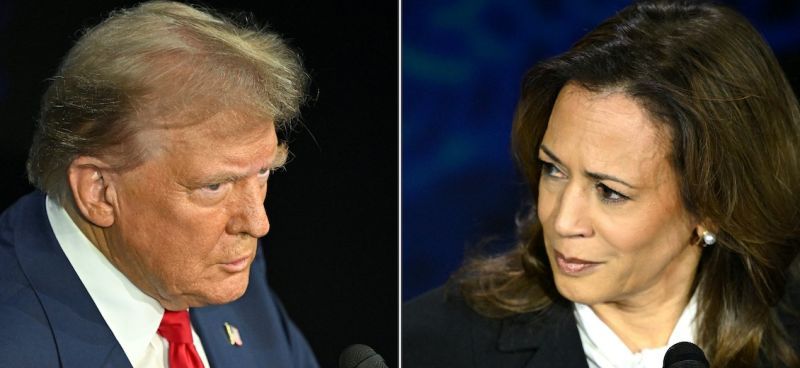- Home
- Middle East
- When U.S. Media Giants Refuse to Endorse Presidential Candidates

This combination of pictures created on September 10, 2024 shows former US President and Republican presidential candidate Donald Trump (L) and US Vice President and Democratic presidential candidate Kamala Harris participating in a presidential debate at the National Constitution Center in Philadelphia, Pennsylvania, on September 10, 2024. ©AFP
The American media are facing a violent backlash in the wake of a presidential race that promises to be as historic as it is chaotic. With two candidates deadlocked to the end, many press outlets have given up their support for the Democratic candidate Kamala Harris or the Republican candidate Donald Trump.
Days ahead of a close presidential election, two of the most prestigious liberal American newspapers have declined to give their usual endorsements to the Democratic Party candidate, sparking furious reactions.
The Los Angeles Times and Washington Post announced they had ended their decades-long practice of officially backing a presidential contender, while The New York Times was among the first to call for a barrage of support for Donald Trump, naming Kamala Harris as the “only patriotic choice” for Americans.
That drew a pointed retort from the Post's former top editor Marty Baron, who suggested his old newspaper was giving in to intimidation from Republican Donald Trump.
"This is cowardice," Baron said on X, "with democracy as its casualty."
The generally left-leaning newspaper -- owned by the billionaire Jeff Bezos, founder and owner of Amazon -- was about to back Kamala Harris but said Friday that it would no longer endorse presidential candidates in any future election.
That decision, following a similar move by the Los Angeles Times, sent shock waves through politics and journalism.
The Post, in seeking to justify its choice, said: "Our job as the newspaper of the capital city of the most important country in the world is to be independent. And that is what we are and will be."
But the newspaper's guild, representing its journalists, said it was "deeply concerned," adding that "an endorsement for Kamala Harris was already drafted, and the decision to not publish was made by The Post's owner, Jeff Bezos."
Earlier in the week, the billionaire owner of the Los Angeles Times, Patrick Soon-Shiong, overruled the paper's editorial staff, which also wanted to endorse Vice President Harris.
Several Times employees of both papers resigned in protest, including editorials editor Mariel Garza.
"I want to make it clear that I am not okay with us being silent," she said in an interview. "In dangerous times, honest people need to stand up."
Billionaires' Power
The Trump campaign responded with delight, saying, "Kamala is such an empty vessel, the Washington Post has decided to nuke presidential endorsements altogether rather than back her candidacy.
Many readers of both papers expressed outrage, vowing to cancel their subscriptions.
The decision not to endorse stemmed partly from the papers "not wanting to alienate potential readers," said Dannagal Young, a professor of communications at the University of Delaware.
But "let's be clear," she added. "The media mogul class is probably not very inclined to want to alienate (a person) who could be the president. "People want to be on the good side of Donald Trump."
Many media owners have financial interests linked to the government. Bezos holds shares in companies with substantial contracts with the administration, including the Pentagon.
Dan Kennedy, a journalism professor at Northeastern University, said media owners were engaging in "anticipatory obedience."
For them "to take a pass on the presidential race this late in the campaign smacks of giving in to the punishment they might be subjected to if Trump returns to office," he added in a blog.
Fading Print Giants
Nonetheless, Harris this year won endorsements from the New York Times, the Boston Globe, Rolling Stone magazine, and the Philadelphia Inquirer.
Trump, for his part, won the backing of the conservative Washington Times and the New York Post, a tabloid owned by magnate Rupert Murdoch.
But while both campaigns have increasingly bet on the influence of newer platforms like podcasts and TikTok, endorsements from prestige media "still matter," said Jane Hall, a communications professor at American University.
Read more



Comments